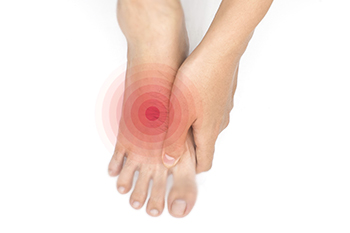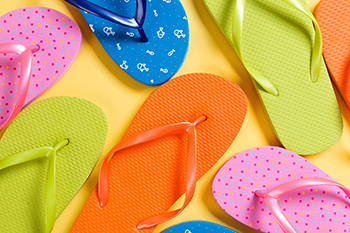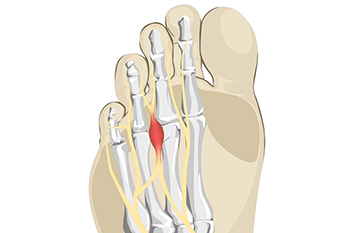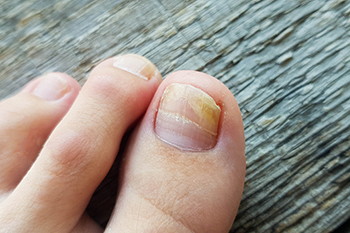Items filtered by date: March 2023
Foot Care for Diabetic Patients Is Crucial

Practicing good foot care in diabetic patients is crucial in preventing infections from occurring. Diabetes happens as a result of elevated blood sugar levels, and it often affects the feet. It is important to maintain a proper foot care routine, which can be significant in preventing unwanted foot conditions from developing. This can consist of washing and drying the feet daily, followed by inspecting the soles by using a mirror. It can be useful in noticing existing cuts, bruises, or scrapes that have developed, in addition to noticing any skin color changes. It is beneficial to prop the feet up frequently during the day, which may help to improve circulation. Wearing shoes that fit correctly, and refraining from walking barefoot, may aid in protecting diabetic feet. If you have diabetes, it is strongly suggested that you are under the care of a podiatrist who can help you to manage this condition.
Diabetic foot care is important in preventing foot ailments such as ulcers. If you are suffering from diabetes or have any other concerns about your feet, contact Dr. Ronald Sheppard from Warren-Watchung Podiatry Center. Our doctor can provide the care you need to keep you pain-free and on your feet.
Diabetic Foot Care
Diabetes affects millions of people every year. The condition can damage blood vessels in many parts of the body, especially the feet. Because of this, taking care of your feet is essential if you have diabetes, and having a podiatrist help monitor your foot health is highly recommended.
The Importance of Caring for Your Feet
- Routinely inspect your feet for bruises or sores.
- Wear socks that fit your feet comfortably.
- Wear comfortable shoes that provide adequate support.
Patients with diabetes should have their doctor monitor their blood levels, as blood sugar levels play such a huge role in diabetic care. Monitoring these levels on a regular basis is highly advised.
It is always best to inform your healthcare professional of any concerns you may have regarding your feet, especially for diabetic patients. Early treatment and routine foot examinations are keys to maintaining proper health, especially because severe complications can arise if proper treatment is not applied.
If you have any questions please feel free to contact one of our offices located in Marlboro and Watchung, NJ . We offer the newest diagnostic and treatment technologies for all your foot and ankle needs.
History of Flip-Flops

Flip-flops are notoriously a potentially detrimental type of footwear that can wreak havoc on the health of an individual’s feet. Flip-flops were originally created to be only a summer-time shoe, used for beachwear. The name “flip-flops” became popularized in the 1950s. Since this time, flip-flops have grown in popularity and the shoe has been used outside of the beach context. Unfortunately, flip-flops do not provide significant foot support, which can essentially set the foot up for the development of a foot condition or affliction. Since the toes must scrunch up to keep the shoe on the foot, this can also set the foot up for the onset of a foot condition. If you wear flip-flops, it is suggested that you contact a podiatrist today for more information.
Flip-flops are not always the best choice of footwear. If you have any concerns about your feet or ankles, contact Dr. Ronald Sheppard from Warren-Watchung Podiatry Center. Our doctor will assist you with all of your foot and ankle needs.
Flip-Flops and Feet
When the weather starts warming up, people enjoy wearing flip-flops. Flip-flops are comfortable, stylish, and easy to slip on and off; they're perfect for any summer beach goer. However, these shoes can cause harm to the feet.
How Can Flip-Flops Affect Me Long-Term?
- Ankle problems
- Hip problems
- Lower back problems
- Pain in the balls of the feet
- Problems with foot arches
- Changes in the way you walk
Are There Injuries Associated with Flip-Flops?
Yes. Since flip-flops are relatively weak and do not provide the same amount of support as sneakers, people who wear flip-flops regularly are more susceptible to injuries. On top of that, the open nature of the shoe makes your feet more prone to other problems, such as cuts and even infections. Common injuries and ailments include:
- Sprained ankles
- Blisters
- Infections
- Cuts and Scrapes
I like Wearing Flip-Flops. Are There Safe Alternatives?
When buying flip-flops, try to find ones that have sturdy soles and that are made of high-quality materials that will support for your feet. These flip-flops will cost more but will also last longer as a result.
If you have any questions please feel free to contact one of our offices located in Marlboro and Watchung, NJ . We offer the newest diagnostic and treatment technologies for all your foot and ankle needs.
It's Time for Beautiful Feet
Where Is Morton’s Neuroma Pain Felt?

Morton’s neuroma is a benign foot condition that causes pain between the third and fourth toes. Wearing tight shoes, such as high heels, may cause the nerve between these two toes to become compressed or irritated, which may cause pain and discomfort. Some patients explain the sensation of Morton’s neuroma as stepping on a marble or small rock stuck inside their shoe. Some also say it feels like pins and needles. Relief may come from wearing custom-made orthotics, in addition to performing stretches to help strengthen the foot. In severe cases, surgery may be necessary to remove the affected nerve for permanent healing. If you have pain in this part of your foot, it is suggested that you schedule an appointment with a podiatrist who can effectively diagnose and treat Morton’s neuroma.
Morton’s neuroma is a very uncomfortable condition to live with. If you think you have Morton’s neuroma, contact Dr. Ronald Sheppard of Warren-Watchung Podiatry Center. Our doctor will attend to all of your foot care needs and answer any of your related questions.
Morton’s Neuroma
Morton's neuroma is a painful foot condition that commonly affects the areas between the second and third or third and fourth toe, although other areas of the foot are also susceptible. Morton’s neuroma is caused by an inflamed nerve in the foot that is being squeezed and aggravated by surrounding bones.
What Increases the Chances of Having Morton’s Neuroma?
- Ill-fitting high heels or shoes that add pressure to the toe or foot
- Jogging, running or any sport that involves constant impact to the foot
- Flat feet, bunions, and any other foot deformities
Morton’s neuroma is a very treatable condition. Orthotics and shoe inserts can often be used to alleviate the pain on the forefront of the feet. In more severe cases, corticosteroids can also be prescribed. In order to figure out the best treatment for your neuroma, it’s recommended to seek the care of a podiatrist who can diagnose your condition and provide different treatment options.
If you have any questions, please feel free to contact one of our offices located in Marlboro and Watchung, NJ . We offer the newest diagnostic and treatment technologies for all your foot care needs.
Toenail Fungus May Lead to Foot Conditions

Many people have the foot condition that is known as toenail fungus, and can be under the impression it may be a cosmetic issue. Research has shown it is beneficial to have it promptly treated, and this may help to prevent potential complications from arising. Toenail fungus can gradually worsen, and the infected nail can thicken and cause foot pain. It may be difficult to walk while wearing shoes, and it may spread to other toes. Additionally, the skin on the feet may become itchy and red, which may indicate athlete's foot has developed. People who are diabetic have to be extremely careful the fungus does not cause the skin to crack, which may lead to bleeding and infections. In severe cases of toenail fungus, the nail can become brittle, and may have to be partially or completely removed as treatment begins. If you have developed toenail fungus, it is suggested that you speak with a podiatrist who can offer you the treatment method that is right for you.
For more information about treatment, contact Dr. Ronald Sheppard of Warren-Watchung Podiatry Center. Our doctor can provide the care you need to keep you pain-free and on your feet.
Toenail Fungus Treatment
Toenail fungus is a condition that affects many people and can be especially hard to get rid of. Fortunately, there are several methods to go about treating and avoiding it.
Antifungals & Deterrence
Oral antifungal medicine has been shown to be effective in many cases. It is important to consult with a podiatrist to determine the proper regiment for you, or potentially explore other options.
Applying foot powder on the feet and shoes helps keep the feet free of moisture and sweat.
Sandals or open toed shoes – Wearing these will allow air movement and help keep feet dry. They also expose your feet to light, which fungus cannot tolerate. Socks with moisture wicking material also help as well.
If you have any questions please feel free to contact one of our offices located in Marlboro and Watchung, NJ . We offer the newest diagnostic tools and technology to treat your foot and ankle needs.

